Have you ever looked up at a rooftop and admired the clean lines and geometric beauty of the tiles? Those aren’t just slabs of pre-made concrete or clay – often, they’re the result of a marvel of modern engineering called a roof tile panel machine. But what exactly is this machine, and how does it transform raw metal into the protective layer keeping your home safe from the elements?
This comprehensive guide dives deep into the world of roof tile panel machines, exploring their function, the different types available, and the advantages they offer. We’ll also unveil the nitty-gritty aspects like suppliers, pricing, and answer some burning questions you might have. So, buckle up, construction enthusiasts and aspiring roofing revolutionaries, it’s time to embark on a journey into the heart of metal tile creation!
Function of Roof Tile Panel Machines
Imagine a metal sheet – limp and unassuming – feeding itself into a sophisticated machine. Inside, a series of rollers, strategically shaped and aligned, work their magic. With each press and bend, the sheet transforms, taking on the distinct profile of a roof tile.
This, in essence, is the function of a roof tile panel machine. Cold roll forming is the technical term for this process, where the machine utilizes a sequence of precisely configured rollers to continuously shape the metal sheet into the desired roof tile profile. Think of it like rolling out cookie dough and using cookie cutters to create unique shapes – only on an industrial scale and with a whole lot more metal!
Here’s a closer look at the cold roll forming process:
- Feeding: The metal sheet, typically made from galvanized steel or aluminum, is fed from a coil into the machine.
- Shaping: The sheet passes through a series of rollers, each progressively shaping the metal into the final profile. The rollers have intricate grooves and contours that mimic the desired tile design.
- Trimming: Once formed, the shaped metal sheet is trimmed to the specific width of the tile.
- Punching: Depending on the tile design, holes might be punched into the formed sheet for fastening purposes.
- Run-off: The finished roof tile panels emerge from the machine, ready for stacking, coating (if desired), and transportation to the construction site.
The entire process is a marvel of automation and precision engineering. Roof tile panel machines can churn out tiles at impressive speeds, significantly increasing production efficiency compared to traditional methods of manufacturing pre-formed tiles.

Types of Roof Tile Panel Machines
Not all roof tile panel machines are created equal. Just like there’s a variety of roof tile designs, there’s a corresponding variety of machines to produce them. Here’s a breakdown of the most common types:
- Standing Seam Roof Panel Machines: These machines create interlocking metal panels with a raised seam on one or both sides. The panels are designed to snap together securely, forming a watertight and durable roof system.
- Stone Coated Steel Roof Panel Machines: These machines produce metal panels that are embossed to resemble the look of natural slate or stone tiles. They offer the aesthetic appeal of traditional materials with the lightweight advantage and affordability of metal.
- Curved Roof Tile Panel Machines: As the name suggests, these machines are specifically designed to create curved roof tile panels. These are ideal for creating unique architectural features or for roofing dome-shaped structures.
- Double Layer Roof Tile Panel Machines: These machines create metal roof panels with a foam core sandwiched between two thin metal sheets. This double-layer construction offers superior insulation properties, making them ideal for energy-efficient buildings.
Choosing the right type of roof tile panel machine depends on several factors, including:
- The desired profile of the roof tiles
- The material of the roof tiles (steel, aluminum, etc.)
- The thickness of the metal sheet
- The production capacity needed
Here’s a table summarizing the function, types, applications, and some key considerations for each type of roof tile panel machine:
| Feature | Standing Seam Roof Panel Machines | Stone Coated Steel Roof Panel Machines | Curved Roof Tile Panel Machines | Double Layer Roof Tile Panel Machines |
|---|---|---|---|---|
| Function | Creates interlocking metal panels with a raised seam | Creates metal panels embossed to resemble natural slate or stone tiles | Creates curved metal roof tile panels | Creates metal roof panels with a foam core |
| अनुप्रयोग | Residential, commercial, industrial roofing | Residential roofing | Curved architectural features, dome-shaped structures | Residential, commercial roofing (focusing on energy efficiency) |
| Considerations | Requires skilled labor for installation | Offers a wide variety of aesthetic options | Requires specialized tooling |
Suppliers and Pricing of Roof Tile Panel Machines
Now that you’re familiar with the different types of roof tile panel machines and their functionalities, it’s time to explore the world of suppliers and pricing. Finding the right machine for your needs depends not just on technical specifications but also on factors like reputation, after-sales service, and of course, cost.
Here’s a glimpse into the landscape of roof tile panel machine suppliers:
- Established Metalworking Machinery Manufacturers: Several big names in the metalworking machinery industry offer roof tile panel machines as part of their product portfolio. These companies typically have a global presence, extensive experience, and well-established service networks. Examples include Murata Machinery, Ltd. (Japan), Shougang Corporation (China), and RAS Systems (Italy).
- Regional Machine Builders: There are also numerous regional machine builders specializing in roof tile panel machines. These companies might cater to specific geographic markets or offer more customized solutions. They often provide a more personalized touch and competitive pricing compared to larger manufacturers.
When it comes to pricing, roof tile panel machines are a significant investment. The cost can vary greatly depending on several factors, including:
- The type of machine: More complex machines capable of producing a wider variety of profiles or incorporating additional features like curving or double-layering will naturally be more expensive.
- The capacity of the machine: Machines with higher production outputs will command a premium price tag.
- The level of automation: Highly automated machines with features like automatic coil loading and unloading will cost more than those requiring manual intervention.
- Brand reputation and after-sales service: Established brands with a proven track record of quality and reliable after-sales service might charge more than lesser-known manufacturers.
Here’s a table providing a general idea of the price range for different types of roof tile panel machines:
| Type of Machine | Estimated Price Range (USD) |
|---|---|
| Standing Seam Roof Panel Machine | $20,000 – $100,000 |
| Stone Coated Steel Roof Panel Machine | $30,000 – $150,000 |
| Curved Roof Tile Panel Machine | $50,000 – $200,000 |
| Double Layer Roof Tile Panel Machine | $40,000 – $250,000 |
It’s important to remember that these are just ballpark figures. The actual price you pay will depend on the specific features and capabilities of the machine you choose. It’s always wise to get quotes from multiple suppliers and carefully compare specifications before making a final decision.
Here are some additional tips for finding the right roof tile panel machine supplier:
- Research the company’s reputation: Look for online reviews and testimonials from other customers.
- Consider the warranty and after-sales service: Ensure the supplier offers a comprehensive warranty and reliable after-sales support.
- Factor in training and installation costs: Some suppliers might offer training programs for operating the machine and installation services.
- Don’t be afraid to negotiate: Get quotes from several suppliers and see if there’s room for negotiation on price.
By following these tips, you can ensure you find a roof tile panel machine supplier that meets your needs and budget.
-
 वेल्ड पाइप रोल बनाने की मशीन
वेल्ड पाइप रोल बनाने की मशीन -
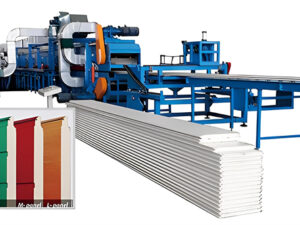 गेराज दरवाजा पैनल रोल बनाने की मशीन
गेराज दरवाजा पैनल रोल बनाने की मशीन -
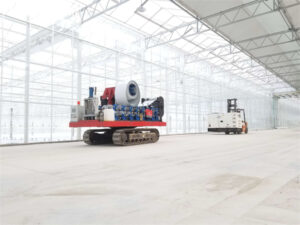 टैंक श्रृंखला के साथ ग्रीन आधुनिक कृषि गटर पैनल रोल बनाने की मशीन
टैंक श्रृंखला के साथ ग्रीन आधुनिक कृषि गटर पैनल रोल बनाने की मशीन -
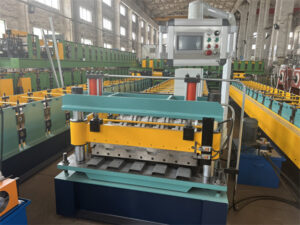 स्वचालित रूप से PPGI बाड़ पैनल के लिए रोल बनाने की मशीन चीन
स्वचालित रूप से PPGI बाड़ पैनल के लिए रोल बनाने की मशीन चीन -
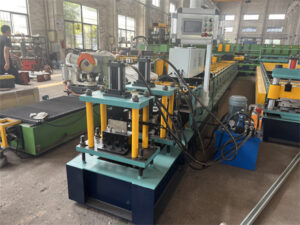 बाड़ गाइड रेल के लिए रोल बनाने की मशीन कंपनी
बाड़ गाइड रेल के लिए रोल बनाने की मशीन कंपनी -
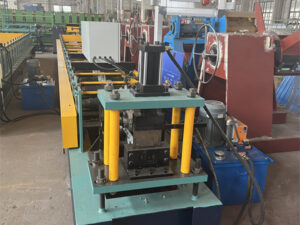 बाड़ पोस्ट गाइड रेल अच्छी कीमत के लिए रोल बनाने की मशीन की लागत
बाड़ पोस्ट गाइड रेल अच्छी कीमत के लिए रोल बनाने की मशीन की लागत -
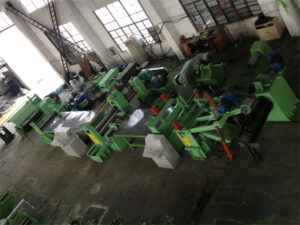 कट टू लेंथ लाइन
कट टू लेंथ लाइन -
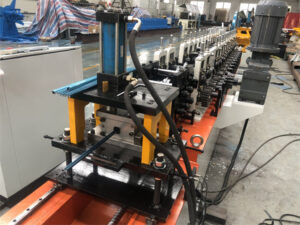 ग्लास विंडो सपोर्टर मशीन के लिए स्टेनलेस यू चैनल
ग्लास विंडो सपोर्टर मशीन के लिए स्टेनलेस यू चैनल -
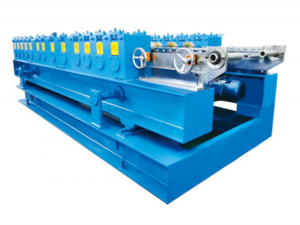 शटर बॉक्स सीरीज बनाने की मशीन
शटर बॉक्स सीरीज बनाने की मशीन
Advantages of Roof Tile Panel Machines
So, why choose a roof tile panel machine over traditional methods of manufacturing roof tiles? Here’s a compelling breakdown of the key advantages:
- Cost-effectiveness: Roof tile panel machines offer significant cost savings in the long run. The production process is automated and efficient, leading to lower labor costs. Additionally, metal roof tiles themselves are generally less expensive than other materials like concrete or slate.
- Durability: Metal roof tiles produced by these machines are incredibly durable and can withstand harsh weather conditions for decades. They are resistant to fire, rot, and insect infestation, making them a low-maintenance roofing solution.
- Lightweight: Metal roof tiles are significantly lighter than traditional materials like concrete or clay tiles. This translates to reduced weight load on the building structure, which can be a major advantage in earthquake-prone areas or for buildings with limited weight capacity.
- Versatility: Roof tile panel machines can produce a wide variety of roof tile profiles. This allows for architectural creativity and the ability to match the aesthetic style of any building.
- Sustainability: Metal roof tiles have a long lifespan and can be recycled at the end of their useful life. Additionally, the production process in roof tile panel machines generates minimal waste compared to traditional methods of manufacturing roof tiles. This makes them an environmentally friendly choice for construction projects.
- Energy Efficiency: Metal roof tiles reflect sunlight and can help regulate the interior temperature of a building. This can lead to lower energy costs for heating and cooling. In the case of double-layer roof tile panel machines, the foam core provides additional insulation properties, further enhancing energy efficiency.
- Quick and Easy Installation: Metal roof tiles produced by these machines are lightweight and easy to install. This reduces labor costs and shortens construction timelines. Many metal roof tile profiles also interlock securely, eliminating the need for a lot of additional fasteners.
- Low Maintenance: Metal roof tiles require minimal maintenance. They are resistant to rust and corrosion, and a simple cleaning with water is usually sufficient to keep them looking their best.
Disadvantages of Roof Tile Panel Machines
While roof tile panel machines offer a compelling set of advantages, it’s important to acknowledge some potential drawbacks as well:
- High Initial Investment: The initial cost of purchasing a roof tile panel machine can be significant. This might be a deterrent for smaller roofing companies or those just starting out.
- Complexity of Operation: Operating a roof tile panel machine requires a certain level of technical expertise. Proper training is essential to ensure the machine is operated safely and efficiently.
- Noise Pollution: The roll-forming process in these machines can generate significant noise. This needs to be taken into consideration if the machine will be used in a residential area.
- Limited Design Flexibility: While there’s a wide variety of roof tile profiles available, roof tile panel machines might not be able to replicate very specific or custom designs.
- Susceptibility to Dents: Metal roof tiles can be susceptible to dents if improperly handled during installation or walked on during maintenance.
Choosing the Right Roof Tile Panel Machine
Now that you’ve explored the functionalities, types, suppliers, pricing, advantages, and disadvantages of roof tile panel machines, it’s time to carefully consider which option is right for you. Here are some key factors to ponder:
- Your Production Needs: Consider the volume of roof tiles you plan to produce and the variety of profiles you require.
- Your Budget: Be realistic about the initial investment you can afford and factor in ongoing costs like maintenance and tooling.
- Your Skillset: Do you have the in-house expertise to operate and maintain the machine, or will you need to factor in training costs?
- The Scope of Your Projects: If you specialize in custom roofing projects, a machine with greater design flexibility might be necessary.
By carefully evaluating these factors, you can make an informed decision and choose a roof tile panel machine that optimizes your production capabilities and contributes to the success of your roofing business.
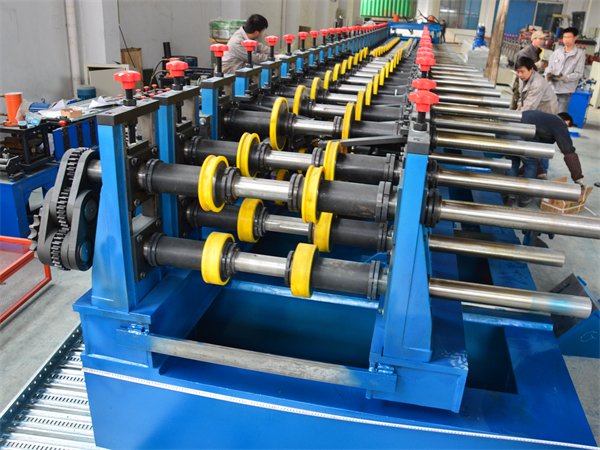
सामान्य प्रश्न
Q: What is the difference between a standing seam roof panel machine and a stone coated steel roof panel machine?
A: Standing seam roof panel machines produce metal panels with a raised seam for interlocking. These panels are known for their clean lines and superior weather resistance. Stone coated steel roof panel machines, on the other hand, create metal panels embossed to resemble natural slate or stone tiles. They offer the aesthetic appeal of traditional materials with the benefits of metal roofing.
Q: How thick can metal roof tiles be made with a roof tile panel machine?
A: The thickness of the metal sheet that can be processed by a roof tile panel machine varies depending on the specific machine’s capabilities. Typically, these machines can handle metal sheets ranging from 0.4mm to 1.2mm thick.
Q: Do I need a permit to operate a roof tile panel machine?
A: Permitting requirements for operating a roof tile panel machine can vary depending on your location. It’s always best to check with your local building department to determine if any permits are necessary.
Q: Can I learn to operate a roof tile panel machine myself?
A: While some basic operation might be possible, it’s highly recommended to undergo proper training provided by the machine supplier. This training will equip you with the knowledge and skills to operate the machine safely, efficiently, and produce high-quality roof tiles.
Q: How much maintenance does a roof tile panel machine require?
A: Roof tile panel machines require regular preventive maintenance to ensure optimal performance and longevity. This typically involves tasks like lubricating moving parts, inspecting for wear and tear, and keeping the machine clean. The specific maintenance schedule will vary depending on the machine model and usage frequency.
Q: What are some safety precautions to take when operating a roof tile panel machine?
A: Operating a roof tile panel machine involves working with heavy machinery and moving parts. Here are some essential safety precautions to follow:
- Always wear appropriate personal protective equipment (PPE) such as safety glasses, gloves, and ear protection.
- Never reach into the machine while it’s operating.
- Ensure proper ventilation to avoid inhaling metal dust or fumes.
- Be aware of pinch points and keep hands clear of moving parts.
- Regularly inspect the machine for any safety hazards and report them immediately.
Q: Where can I find more information about roof tile panel machines?
A: Several resources can provide you with more information about roof tile panel machines:
- Manufacturer websites: Most roof tile panel machine manufacturers have detailed information about their products on their websites, including specifications, brochures, and videos.
- Industry associations: Organizations like the Metal Roofing Alliance (MRA) offer educational resources and publications related to metal roofing and metal roof tile production.
- Trade publications: Trade publications focusing on the construction industry often feature articles and reviews on roof tile panel machines.
By diligently researching and carefully considering all the factors involved, you can confidently embark on utilizing a roof tile panel machine to revolutionize your metal roofing projects. Remember, these machines represent a powerful and versatile technology that can transform the way you approach roofing and contribute to the creation of beautiful, durable, and sustainable structures.
